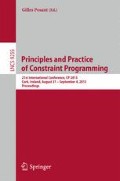Abstract
We revisit the standard hybrid CP/SAT approach for solving disjunctive scheduling problems. Previous methods entail the creation of redundant clauses when lazily generating atoms standing for bounds modifications. We first describe an alternative method for handling lazily generated atoms without computational overhead. Next, we propose a novel conflict analysis scheme tailored for disjunctive scheduling. Our experiments on well known Job Shop Scheduling instances show compelling evidence of the efficiency of the learning mechanism that we propose. In particular this approach is very efficient for proving unfeasibility.
Access this chapter
Tax calculation will be finalised at checkout
Purchases are for personal use only
Preview
Unable to display preview. Download preview PDF.
References
Best known lower/upper bounds for Taillard Job Shop instances. http://optimizizer.com/TA.php (accessed April 15, 2015)
Taillard, É.: http://mistic.heig-vd.ch/taillard/problemes.dir/ordonnancement.dir/jobshop.dir/best_lb_up.txt (accessed April 15, 2015)
Christopher, J.: Beck. Solution-guided multi-point constructive search for job shop scheduling. Journal of Artificial Intelligence Research 29(1), 49–77 (2007)
Bessiere, C.: Constraint propagation. In: van Beek, P., Rossi, F., Walsh, T. (eds.) Handbook of Constraint Programming, volume 2 of Foundations of Artificial Intelligence, pp. 29–83. Elsevier (2006)
Boussemart, F., Hemery, F., Lecoutre, C., Sais, L.: Boosting systematic search by weighting constraints. In: Proceedings of the 16th European Conference on Artificial Intelligence, ECAI 2004, Valencia, Spain, pp. 146–150 (2004)
Carlier, J., Pinson, É.: An algorithm for solving the job-shop problem. Management Science 35(2), 164–176 (1989)
Danna, E.: Structured vs. unstructured large neighborhood search: a case study on job-shop scheduling problems with earliness and tardiness costs. In: Rossi, F. (ed.) CP 2003. LNCS, vol. 2833, pp. 817–821. Springer, Heidelberg (2003)
Feydy, T., Schutt, A., Stuckey, P.J.: Semantic learning for lazy clause generation. In: Proceedings of TRICS Workshop: Techniques foR Implementing Constraint programming Systems, TRICS 2013, Uppsala, Sweden (2013)
Feydy, T., Stuckey, P.J.: Lazy clause generation reengineered. In: Gent, I.P. (ed.) CP 2009. LNCS, vol. 5732, pp. 352–366. Springer, Heidelberg (2009)
Grimes, D., Hebrard, E.: Job shop scheduling with setup times and maximal time-lags: a simple constraint programming approach. In: Lodi, A., Milano, M., Toth, P. (eds.) CPAIOR 2010. LNCS, vol. 6140, pp. 147–161. Springer, Heidelberg (2010)
Grimes, D., Hebrard, E.: Models and strategies for variants of the job shop scheduling problem. In: Lee, J. (ed.) CP 2011. LNCS, vol. 6876, pp. 356–372. Springer, Heidelberg (2011)
Grimes, D., Hebrard, E.: Solving variants of the job shop scheduling problem through conflict-directed search. INFORMS Journal on Computing 27(2), 268–284 (2015)
Grimes, D., Hebrard, E., Malapert, A.: Closing the open shop: contradicting conventional wisdom. In: Gent, I.P. (ed.) CP 2009. LNCS, vol. 5732, pp. 400–408. Springer, Heidelberg (2009)
Lawrence, S.R.: Supplement to resource constrained project scheduling: an experimental investigation of heuristic scheduling techniques. Technical report, Graduate School of Industrial Administration, Carnegie Mellon University, Pittsburgh, PA (1984)
Luby, M., Sinclair, A., Zuckerman, D.: Optimal speedup of Las Vegas algorithms. Information Processing Letters 47(4), 173–180 (1993)
Matthew, W., Moskewicz, C.F., Madigan, Y.Z., Zhang, L., Malik, S.: Chaff: engineering an efficient SAT solver. In: Proceedings of the 38th Annual Design Automation Conference, DAC 2001, Las Vegas, Nevada, USA, pp. 530–535 (2001)
Nuijten, W.: Time and resource constrained scheduling: a constraint satisfaction approach. Ph.D thesis, Eindhoven University of Technology (1994)
Ohrimenko, O., Stuckey, P.J., Codish, M.: Propagation via Lazy Clause Generation. Constraints 14(3), 357–391 (2009)
Pardalos, P.M., Shylo, O.V.: An algorithm for the job shop scheduling problem based on global equilibrium search techniques. Computational Management Science 3(4), 331–348 (2006)
Sadeh, N.M.: Lookahead techniques for micro-opportunistic job-shop scheduling. Ph.D thesis, Carnegie Mellon University, Pittsburgh, PA, USA (1991)
Schutt, A., Feydy, T., Stuckey, P.J., Wallace, M.G.: Solving rcpsp/max by lazy clause generation. Journal of Scheduling 16(3), 273–289 (2013)
Shaw, P.: Using constraint programming and local search methods to solve vehicle routing problems. In: Maher, M.J., Puget, J.-F. (eds.) CP 1998. LNCS, vol. 1520, pp. 417–431. Springer, Heidelberg (1998)
Taillard, É.: Benchmarks for basic scheduling problems. European Journal of Operational Research 64(2), 278–285 (1993). Project Management anf Scheduling
Vilím, P.: Edge finding filtering algorithm for discrete cumulative resources in \({\cal O}(kn\,{\rm log}\,(n))\). In: Gent, I.P. (ed.) CP 2009. LNCS, vol. 5732, pp. 802–816. Springer, Heidelberg (2009)
Vilím, P., Laborie, P., Shaw, P.: Failure-directed search for constraint-based scheduling. In: Michel, L. (ed.) CPAIOR 2015. LNCS, vol. 9075, pp. 437–453. Springer, Heidelberg (2015)
Walsh, T.: Search in a small world. In: Proceedings of the 16th International Joint Conference on Artificial Intelligence, IJCAI 1999, Stockholm, Sweden, pp. 1172–1177 (1999)
Zhang, L., Madigan, C.F., Moskewicz, M.H., Malik, S.: Efficient conflict driven learning in a boolean satisfiability solver. In: Proceedings of the 2001 IEEE/ACM International Conference on Computer-aided Design, ICCAD 2001, San Jose, California, pp. 279–285 (2001)
Author information
Authors and Affiliations
Corresponding author
Editor information
Editors and Affiliations
Rights and permissions
Copyright information
© 2015 Springer International Publishing Switzerland
About this paper
Cite this paper
Siala, M., Artigues, C., Hebrard, E. (2015). Two Clause Learning Approaches for Disjunctive Scheduling. In: Pesant, G. (eds) Principles and Practice of Constraint Programming. CP 2015. Lecture Notes in Computer Science(), vol 9255. Springer, Cham. https://doi.org/10.1007/978-3-319-23219-5_28
Download citation
DOI: https://doi.org/10.1007/978-3-319-23219-5_28
Published:
Publisher Name: Springer, Cham
Print ISBN: 978-3-319-23218-8
Online ISBN: 978-3-319-23219-5
eBook Packages: Computer ScienceComputer Science (R0)

